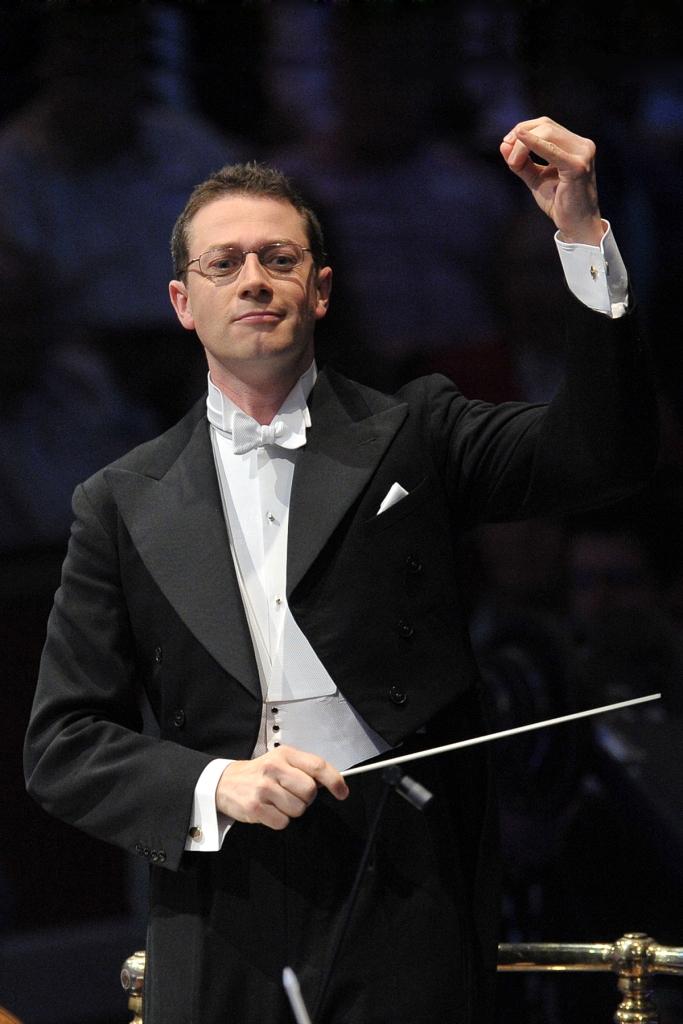Looking at John Wilson conduct, it’s possible to think that you’re watching an incarnation of that Proms favourite of decades past, Sir Malcolm Sargent. The immaculate tailcoat, shining white cuffs, the florid gestures with a baton as long as a magic wand: the only missing visual ingredient is Sargent’s self-regarding air. On Sunday afternoon at the Festival Hall, Wilson, Britain’s golden maestro of light music, garnished the impression by venturing into some of Sargent’s own territory with The Yeomen of the Guard: the only quasi-serious piece among Gilbert and Sullivan’s corpus, and the only known opera whose setting was inspired by an advert for a furniture company (the Tower Furnishing and Finance Service, spotted by Gilbert at Uxbridge station).
Whether Sargent, a G & S stalwart, ever conducted a performance with the warm finesse of Wilson’s semi-staged rendition on Sunday is another matter. Wilson, lucky man, had the Philharmonia Orchestra before him, and one of the performance’s major joys was the experience of hearing a G & S opera played for once by a top-class orchestra with a full complement of players. From the triangle tingler to the brave chap with the bass trombone, every instrumental detail embedded in Sullivan’s lovely score leaped out and winked from the platform. Every single sung word didn’t automatically follow suit, but after years of hating the dislocating effects of amplification in musicals I’m not going to complain when a musical is mounted with no microphones at all.
The weak spot in Wilson’s recent film musical extravaganzas, like Hooray for Hollywood at last summer's Proms, has been his tendency to pick singers expert in modern, jazzy interpretations, but hopeless at approximating any easy, natural period style. He didn’t make the same mistake here. Most had sung in the G & S productions of Opera North, English National Opera, Carl Rosa, or the king of them all, the D’Oyly Carte company. Everyone, more or less, knew how sing Victoriana without sounding arch and how to extract genuine comedy even from Gilbert's more laboured jokes.
Wilson’s conducting effortlessly enabled both orchestra and singers to reach depths of feeling rarely encountered in the G & S repertoire
The simple staging, complete with Janet Morris’s colourful costumes, was in the hands of Simon Butteriss, most expert and bounciest of modern G & S comic baritones. As for props, they were few but judicious: an ominous executioner’s block; a stout halberd; an ancient joke book, dipped into by Butteriss’s engagingly nimble Jack Point, the Elizabethan strolling player and jester ultimately condemned by fate to laugh through his tears and become a near cousin to Pagliacci.
Wilson’s conducting effortlessly enabled both orchestra and singers to reach depths of feeling rarely encountered in the G & S repertoire. The comic numbers whizzed by, as they should, but numbers pressing on matters of love were slowly and lovingly cradled, with notably soft succulence from the Philharmonia strings. Among the cast, Oliver White never quite found his feet as Colonel Fairfax, the Tower of London prisoner who faces the chop, giving us too much of the cardboard cartoon and too little of a solid romantic hero. But it’s a difficult role for anyone to bring off, and there was easily enough success elsewhere to compensate.
Richard Angas, tall and lugubrious, supplied much fruitful comedy as the head jailer Shadbolt, the most prominent vessel for the cruel streak in Gilbert’s humour. D’Oyly Carte stalwart Jill Pert was the perfect contralto ogre as Dame Carruthers; Sarah Fox made sweet music as Point’s beloved Elsie Maynard; Bruce Graham proved a beefy little beefeater; and if Heather Shipp’s decibel level was sometimes deficient, her comedy playing steadily sharpened as the opera progressed. A little thumbs up too for Rebecca Moon, only in for a brief while as the Dame’s niece, but with a pure, honey-sweet voice that I’d love to smear on toast. Another raised thumb as well for the crisp chorus work of Philharmonia Voices, a far cry from the "senior" sound of G & S recordings in Sargent’s day.
At the end, Butteriss took Jack Point’s lovelorn grief to the edge before (shock! horror!) keeling over in death. Gilbert, according to one account, seemingly wanted it played that way, though his libretto only directs the jester to fall insensible to the ground. I wish Butteriss had stuck to that: having Point prostrate on the floor, desolate but still alive, would definitely have been more emotionally satisfying. A magnificent show, all the same: Wilson repeats it this Saturday in Liverpool with the Royal Liverpool Philharmonic Orchestra.













Add comment